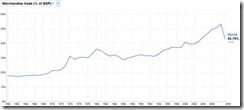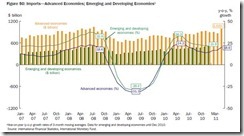In the graphs below the Economist shows of the growing importance of emerging markets relative to the world economy.
The Economist writes, (bold highlights mine)
The combined output of the emerging world accounted for 38% of world GDP (at market exchange rates) in 2010, twice its share in 1990. If GDP is instead measured at purchasing-power parity, emerging economies overtook the developed world in 2008 and are likely to reach 54% of world GDP this year. They now account for over half of the global consumption of most commodities, world exports, and inflows of foreign direct investment. Emerging economies also account for 46% of world retail sales, 52% of all purchases of motor vehicles and 82% of mobile phone subscriptions. They still punch well below their weight in commerce and finance, but they are catching up fast. Almost a quarter of the Fortune Global 500 firms come from emerging markets; in 1995 it was only 4%. The chart below shows more detail of how the economic clout of emerging economies has risen over time:
Except for the ‘consumption of most commodities’ which functions as an effect more than the cause, “world exports, and inflows of foreign direct investments” represent as forces of globalization as further shown below.
Chart from Google’s Public Data
One would note that growth in the share of merchandise trade relative to GDP has more than doubled since 1960s and has breached the 50% level in 2007. But fell below 50% during the last crisis. (chart hasn’t been updated)
The updated chart shows that world trade has now surpassed the previous highs (courtesy of Professor Mark Perry)
And emerging markets' trade liberalization has been leading to hefty increases in the growth trend of imports (chart from ADB) and foreign direct investments.
Bottom line: World trade has played a very significant role in the convergence dynamics of emerging markets and developed economies.





No comments:
Post a Comment